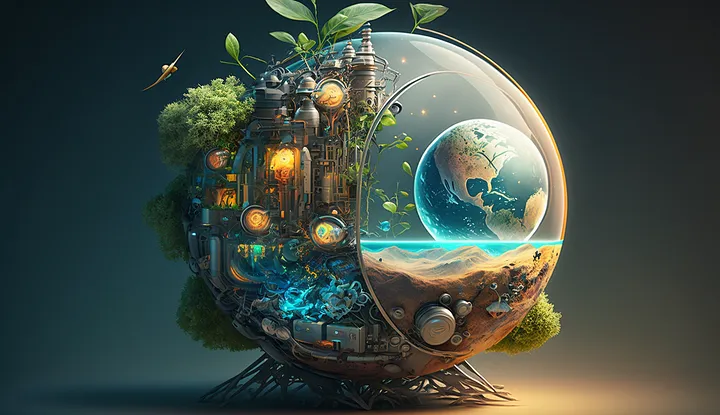For over 30 years now I have been focused on innovation. As a co-founder of LUMAN, where we work with our clients to develop strategies and cultures for the future, I lead a company myself that is constantly transforming and adapting to meet changing client demands.
Our clients and their customers are facing the same situation: Everything seems to be a moving target these days. From the pandemic to new wars, to new weather events nearly every other day, to seemingly sudden advances in technology, the hits just keep on coming — and there is no end of this in sight, on the contrary, it is likely that the next decades will be all about transformation: of our planet, our ecosystems and supply chains, and with AI and hybrid work even of how we organize ourselves to create outcomes together as such.
There will likely be as much technological change in the next decade as we had in the last hundred years. But in a world that is constantly changing, staying the same means drifting into the past (and ultimately into obsolescence).
I get overwhelmed by this at times — and I have been focused on the edge of future developments and transformation all my life.
When I do get overwhelmed, there are two things I remind myself of:
- Learning is the new knowing — learning never stops, and instead of looking at knowing as the rewarding experience, I keep reminding myself to get my dopamine reward from learning itself.
- Keep focus on the opportunity — when everything is in transformation and uncertain, the best thing we can do is slow down enough to think about what we want to create in the first place.
That is where innovation comes in. Most leaders realize they “should” innovate. By why?
Innovation is about bringing in something new that is actually meaningful. It is not about some new widget or app or a faster horse. It is about actively creating the future.
“The future is already here — it’s just not evenly distributed.” ― William Gibson
Some leaders are already getting it and are beginning to lead innovation for the next level of our evolution.
We are on the threshold of something big
For several decades now we have had pictures of earth from space. We do know that we live on one planet and that our current systems are not sufficient to address this situation much longer. We are on our way to become a planetary civilization, and this is where the opportunity lies: to actively create the infrastructure for that future.
A New Era of Business: The Planetary Civilization
To become a planetary civilization (and ultimately a multi-planetary species), we must first address the challenges in our current systems. From climate change to political and financial systems, we need to rethink how we do business. As AI and next-gen technologies replace human labor, it is crucial for organizations to adapt and evolve their models and ways of working to remain relevant and profitable.
Six Steps to Transform Your Organization into an Innovation Leader
- Commit to a Massive Transformational Purpose (MTP): Identify what truly matters to your organization and create a vision for the future. Embrace regenerative business models that not only sustain but also repair the damage done to our planet.
- Find your innovators and early adopters: Include these individuals in co-creating your vision of the future. Empower them to drive change and innovation within the organization.
- Train your people in innovation: Upskill and uplevel your workforce to foster intrapreneurial thinking and leadership. Create a culture of innovation that permeates every level of your organization.
- Be open to prototyping the new: Experiment with new business structures and processes, and be willing to adapt as necessary. Embrace new technologies and ways of operating to stay ahead of the curve.
- Build a pipeline to manage your portfolio of activities: Establish clear criteria for project development stages and manage your organization’s innovation pipeline effectively. Be prepared to sunset outdated projects and business models.
- Tell and spread the story: Communicate your journey, successes, and failures both internally and externally. Use stories to guide and inspire your organization and stakeholders.
Seizing the Opportunity for Meaningful Innovation
As we stand at the threshold of an uncertain future, it is time to envision and define our organizations and ourselves anew. Systemic transformation is also always personal transformation.
As leaders, we get to take the first step, and transform ourselves, so that we can then commit to actively creating the future we want for humanity and using our organizations to contribute to the advancement of humanity in this new stage of development.
Embrace your innovation leadership and build the new infrastructures necessary for a planetary civilization.
Think of who you and your organization could one day have become in the history of our species?
Happy Innovation Day!





